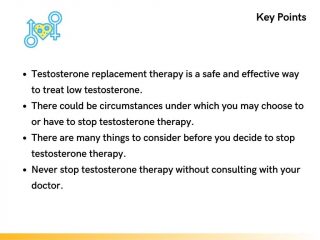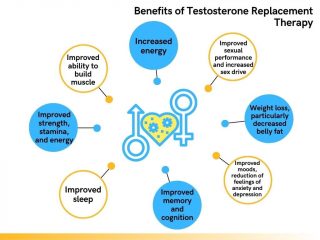What Happens When You Stop Testosterone Replacement Therapy

Testosterone replacement therapy (TRT) is a commonly prescribed treatment for patients with low testosterone levels. While TRT can provide many benefits for men suffering from low testosterone, there are circumstances where you may choose to or have to stop testosterone.
Let’s take a look at what happens when you stop testosterone therapy.
Introduction
Testosterone replacement therapy (TRT) is very effective in treating men with low testosterone. Your first course of testosterone therapy is usually prescribed for six months. After that, you will be evaluated as to whether you need to continue for another six-month session or more. TRT is usually not prescribed indefinitely, and there may come a time when you need to discontinue TRT. However, stopping testosterone replacement therapy should be approached with caution, as it can have significant effects on your health and well-being.
The main thing to keep in mind is to never stop your testosterone therapy on your own without your prescriber’s knowledge and supervision. Read on to learn more about what happens when you stop testosterone replacement therapy and the factors to consider before discontinuing treatment.
Understanding Testosterone Replacement Therapy
Testosterone replacement therapy is used to address low testosterone levels, which can lead to symptoms like decreased libido, fatigue, depression, reduced muscle mass, and decreased bone density. TRT involves administering exogenous testosterone to bring hormone levels back to a healthy range. This therapy can be administered in various forms, including injections, gels, patches, pellets, and oral tablets.
Most doctors agree that testosterone injections are the safest and most effective form of administering TRT.
Overview of Testosterone Replacement Therapy (TRT)
Testosterone is the most important male hormone or “androgen.” Testosterone in males is responsible for all of the changes that occur at puberty when a boy matures into a man. This includes the maturation of the sex organs as well as the “secondary” male sex characteristics such as facial hair, deeper voice, etc.
Even once a man is fully grown, testosterone continues to play a vital role. Testosterone is involved in sex drive, fertility, fat metabolism, and more. However, as critical as testosterone is to a man’s overall health, it is an unfortunate fact of life that testosterone levels decline as a man ages. Testosterone levels peak at about the age of 20. After that, they start a steady decline of about 1%-2% a year. That may not sound like much, but by the time a man is in his 70s, his testosterone level could be HALF of what it was in his 20s!
Most men between the ages of 35 and 65 will be feeling the impact of low testosterone to some degree. Testosterone replacement therapy, as the name implies, is designed to replace the testosterone lost due to aging.
Benefits of Testosterone Replacement Therapy
For men who have been diagnosed with low testosterone due to age-related testosterone loss, TRT can have many benefits. The benefits of testosterone therapy include the following:

Effects of Stopping Testosterone Replacement Therapy
Before making any decisions regarding discontinuing TRT, it is crucial to consult with your healthcare provider. They will evaluate your individual circumstances, medical history, and specific treatment goals to provide personalized advice.
The following is an overview of the effects that could occur once you stop testosterone therapy.
Hormonal Changes
Discontinuing TRT can lead to a hormonal imbalance as the body adjusts to lower testosterone levels. This adjustment period can cause symptoms such as fatigue, mood swings, irritability, decreased muscle mass, and decreased bone density.
Reversal of Positive Effects
There is a chance that once you stop TRT that the symptoms that prompted your doctor to prescribe it for you in the first place may return. If your initial symptoms of low testosterone return after stopping TRT, it may affect your quality of life. It is crucial to assess whether the potential benefits of discontinuing TRT outweigh the risks of symptom recurrence.
Potential Health Implications
There could be other health implications of stopping TRT. For example, testosterone plays a significant role in mood regulation, and stopping TRT can lead to emotional and psychological changes. It is important to monitor your mental well-being and seek support if needed.
Withdrawal Symptoms
One does not technically experience physical or emotional “withdrawal” from testosterone as one would from an additive drug like opioids but in addition to the effects mentioned above when you cease taking TRT, you may also feel decreased energy levels and feelings of exhaustion. You may also experience a general lack of motivation and find it harder to engage in physical and mental activities.
Considerations Before Stopping Testosterone Replacement Therapy
Before stopping your TRT, it is essential that you identify the reason behind your decision to stop testosterone replacement therapy. Common reasons include achieving fertility, undesirable side effects, or financial considerations. Discussing these reasons with your healthcare provider will help determine if, indeed, you should stop your TRT and the most suitable way to do so if that determination is made.
Consultation with a Healthcare Provider
Never stop your TRT on your own. It is imperative that you discuss your concerns with your healthcare provider before taking it upon yourself to cease your testosterone replacement therapy. Your healthcare provider will assess your overall health and monitor any changes in symptoms or potential side effects of TRT. This evaluation will help determine whether discontinuing TRT is the right course of action.
Gradual Tapering and Monitoring
Stopping TRT abruptly can exacerbate hormonal imbalances. Gradually tapering off the treatment allows the body time to adapt more effectively. Work closely with your healthcare provider to develop an appropriate tapering plan.
Regular monitoring of hormone levels, symptoms, and overall health is essential during the transition phase. This monitoring will help identify any potential issues and guide further treatment decisions.
Exploration of Alternative Treatment Options
If you must stop your TRT, adopting a healthy lifestyle can support natural testosterone production and minimize the impact of discontinuing TRT. Focus on regular exercise, a balanced diet, stress management, and quality sleep to optimize overall well-being.
The Bottom Line on Stopping TRT
Deciding to discontinue testosterone replacement therapy is a complex decision that should be made in consultation with your healthcare provider. It is essential to consider various factors, such as your overall health, symptoms, and treatment goals. Understanding the potential effects of stopping TRT and managing the transition effect will ensure a smoother adjustment period. By working closely with your healthcare provider, you can navigate the process and make informed decisions that align with your individual needs.

